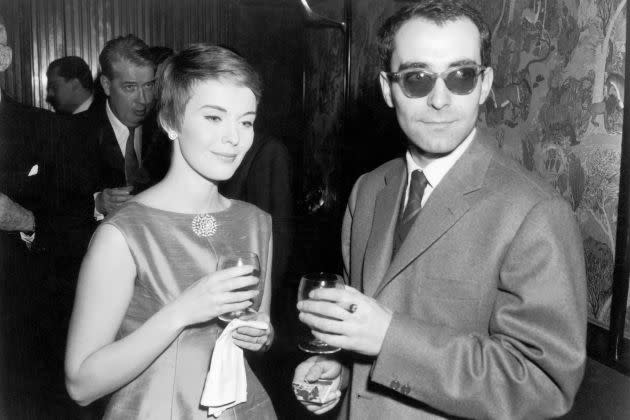Jean-Luc Godard’s Films: A Photo Gallery
- Oops!Something went wrong.Please try again later.

Jean-Luc Godard, a leading figure of the French New Wave, died on September 13 at 91. According the the BBC, a family member said the legendary director died by assisted suicide in Switzerland.
Godard was one of most heralded directors of his day, though he never embraced Hollywood or the mainstream film world and was best known for his radical and politically driven work. Click above for a gallery of some of his films.
More from Deadline
McCarthy: A Remembrance Of The Stubborn & Iconoclastic Jean-Luc Godard
Born in Paris in 1930, Godard grew up and attended school in Nyon, Switzerland. After moving back to Paris after finishing school in 1949, he found a home amongst the burgeoning group of young film critics in the city’s ciné clubs. Godard began writing for the new film magazines including Andre Bazin’s soon-to-be-influential Cahiers du Cinema.
Godard is best known for his seminal work of the 1960s including Le mépris (Contempt), starring Brigitte Bardot, and Le Petit Soldat, which was banned until 1963 and starred the director’s future wife, Anna Karina. In 1970, Godard met filmmaker Anne-Marie Miéville who would become a regular collaborator, and later a romantic partner after the end of his second marriage to actress and writer Anne Wiazemsky, who had starred in his 1967 political satire La Chinoise. Godard continued to work prolifically in his later years and enjoyed what many described as a late-career renaissance in the early 2000s starting with In Praise of Love (2001), which screened at Cannes, followed by Film Socialisme (2010).
Take Two: Remembering Jean-Luc Godard
Deadline’s Todd McCarthy writes, “Ever impudent and exasperating, forever pushing boundaries but remaining elusive, and an artist in every fiber of his being, Godard always did exactly what he wanted to do; for a few years many followed him ardently, and for lots of us in the 1960s he led the way into a vastly exciting and personal form of cinema. Thereafter he went entirely his own way, losing most of his audience but remaining at the forefront of exploring what cinema is, could be, and, sometimes, what it absolutely shouldn’t be. …
“Although Godard consumed and brilliantly wrote about the existing cinema as a young critic, he never followed the accepted rules of the game creatively. Instead, he introduces jarring cuts, abrupt transitions, wild pursuits through city streets, spontaneous amorous escapades and an unending barrage of fresh ideas about how to put stories and characters on the screen in a vibrant real world, initially on the streets of Paris in Breathless.”
After his death, tributes came from all over the world.
French President Emmanuel Macron said France has lost a “national treasure” and called the director the most “iconoclastic of New Wave filmmakers.”
Jean-Luc Godard Tributes Pour In From The World Of Cinema And Beyond: “National Treasure”
Jack Lang, former Culture Minister of France, said Godard was “unique, absolutely unique… He wasn’t just cinema, he was philosophy, poetry.”
Gilles Jacob, former president of the Cannes Film Festival, described Godard as the “Picasso of cinema.”
Launch Gallery: Jean-Luc Godard: A Collection Of The Director's Films
Best of Deadline
NFL 2022 Schedule: Primetime TV Games, Thanksgiving Menu, Christmas Tripleheader & More
The Queen Onscreen: 15 Actresses (And Actors) Who've Played Elizabeth II In Film And On TV
'Blonde' Premiere Photo Gallery: Ana de Armas Channels Marilyn Monroe At Venice Film Festival
Sign up for Deadline's Newsletter. For the latest news, follow us on Facebook, Twitter, and Instagram.

